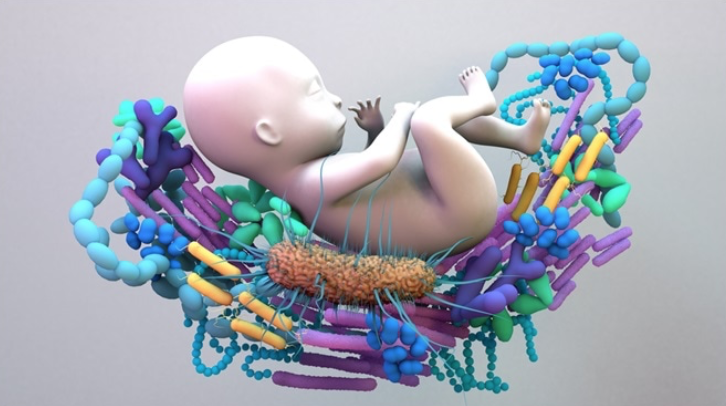
By Registered Health Visitor – Julia Headland
What is Gut Microbiome?
Gut Microbiome refers to all the microorganisms that live in our intestines. These include bacteria, viruses and fungi and are collectively known as microbiome. They are also present on our skin. Although many different types of microbes live inside us, it is bacteria that is most studied and what we probably hear most about. The reason why Gut Microbiome is so important is because it affects our bodies in several ways and plays a key role in promoting the smooth daily operation of our bodies including digestion, immune health, skin health and mental well-being.
Our childhood years are very important for all aspects of development and the first 1000 days of a child’s life lay many foundations for their health and physical, cognitive, social, emotional, and behavioural development.
A person is first exposed to microorganisms in the womb and as an infant, during both the delivery via the birth canal and by breast milk. Later in life, a person’s microbiome is influenced by environmental exposures and by diet and
these can either change someone’s microbiome to be beneficial to health or place someone at risk of disease. Microbiome consists of microbes that are both helpful and potentially harmful to us. Most are symbiotic (where both the human body and microbiota benefit) and some can be pathogenic (promoting disease). In a healthy body, pathogenic and symbiotic microbiota coexist without any problems. However, if there is a disturbance in this balance, dysbiosis occurs, stopping these normal interactions, therefore potentially making the body more susceptible to disease.
Factors that can affect Microbiome development in children:
Birth: Gut Microbiota, vaginal flora of mother, delivery method, antibiotics.
Infant<1year: Feeding method, antibiotics, probiotics, genetics, environment.
Toddler 1-3 years: diet, environment, antibiotics.
Child 3-12 years: diet, school, antibiotics, lifestyle.
(Optibac 2023)
What causes an imbalance of Microbiota?
Infectious illnesses
Certain diets
Prolonged use of antibiotics
Bacteria destroying medicines
The Importance of Diet on your Child’s Microbiome.
We have all heard of the five a day message encouraging us all to eat at least five portions of fruit and vegetables a day.
This is so important as fruits and vegetables have been shown to enrich the microbiome and enhance gut health.
One main reason for this is that they contain fibre. Other important fibres are known as prebiotics, and these can further support the growth of good bacteria. Examples of foods containing prebiotics are onions, garlic, chicory, and artichokes. These can easily be added to children’s meat and vegetarian dishes without your children even noticing!!
One of the most important elements crucial to gut health are Short Chain Fatty Acids (SCFAs). These SCFA’s are produced by the fermentation of indigestible fibres. These SCFA’s are used by the body as a nutrient source but also play a key role in muscle function and possibly the prevention of chronic diseases including certain cancers and bowel disorders. This is one of the reasons that a high fibre diet is widely advised.
As well as increasing the good food, it is advisable to limit sugar. Unfortunately, sugar has a poor effect on the diversity of the gut microbiome. Simply put, sugar can change your microbiome by increasing bad bacteria and reducing the good bacteria, thus potentially leading to inflammation, disease, and infection. Occasional sugary treats are unlikely to cause too much damage, but regular sugar consumption is going to negatively affect the gut microbiome as well as causing health problems later in life such as diabetes, liver disease and obesity.
What can you do to Improve your Child’s Gut Microbiome?
Breast feed when possible choose wholefoods over processed foods
Choose a wide variety of plant foods
Eat probiotic food like yogurt, kefir and other fermented foods
As well as fruits and vegetables, look to eat nuts, seeds, beans and legumes too
*Steer clear of unnecessary antibiotic use
*If your child is taking antibiotics, try and give probiotic foods such as natural yogurt or kefir to try and add good bacteria to replenish the gut whilst they are on the antibiotics.
———End———
For those people I have not yet met, my name is Julia Headland and I am a registered health visitor and registered general nurse with a degree in public health and over 20 years of experience. I am very pleased to work alongside the Norfolk House Nursery team.
You can arrange to meet me for confidential advice or guidance about your child’s health or development; during the pandemic these consultations are being conducted by Zoom or telephone.
My consultations are free of charge and they are confidential.
You can book an appointment with me via the Norfolk House Nursery staff.
You can also follow me on social media:
Facebook: @JuliaHeadlandPrivateHealthVisitor
Instagram: jh_privatehealthvisitor
